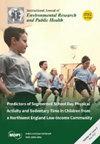Understanding the Wellbeing Needs of First Nations Children in Out-of-Home Care in Australia: A Comprehensive Literature Review
3区 综合性期刊
Q1 Medicine
International Journal of Environmental Research and Public Health
Pub Date : 2024-09-13
DOI:10.3390/ijerph21091208
引用次数: 0
Abstract
Introduction: Despite the increasing overrepresentation of Aboriginal and Torres Strait Islander (hereafter respectfully referred to as First Nations) children living in out-of-home care (OOHC) in Australia, little is known about their wellbeing needs. This comprehensive literature review aimed to identify these needs and the features of care required to meet them. Methods: MEDLINE, CINAHL, Scopus, Informit, PsycINFO, and Embase databases and relevant grey literature were searched from inception to December 2023 for articles presenting qualitative accounts and perspectives relevant to the wellbeing needs of First Nations children in OOHC. These included reports from First Nations children in OOHC; First Nations adults with lived experience of OOHC; carers, caseworkers, and organizational stakeholders; and First Nations community members with relevant lived and/or professional experience. We used the Preferred Reporting Items for Systematic Reviews and Meta-Analyses (PRISMA) guidelines and Braun and Clarke’s reflexive thematic analysis method for data analysis. Results: Thirty-five articles (19 peer-reviewed, 16 grey literature) met the inclusion criteria. Our analysis revealed six wellbeing needs of First Nations children in OOHC: Being seen, being heard; a sense of stability; holistic health support; social and cultural connections; culturally safe OOHC providers; and preparedness for transitioning out of care. A range of features of OOHC were also identified as critical for supporting these needs. Conclusions: Our findings suggest that First Nations children in OOHC have unique wellbeing needs in addition to safety, security, and health. Attention to the development and maintenance of social and cultural connections is an important concern that must be addressed by OOHC providers (caseworkers and organizations) and carers and supported by OOHC policy and the associated systems in Australia as part of providing culturally safe and supportive care.了解澳大利亚家庭外照料中原住民儿童的福祉需求:全面文献综述
导言:尽管澳大利亚接受家庭外照料(OOHC)的土著和托雷斯海峡岛民(以下简称原住民)儿童人数越来越多,但人们对他们的福利需求却知之甚少。本综合文献综述旨在确定这些需求以及满足这些需求所需的护理特点。研究方法检索了 MEDLINE、CINAHL、Scopus、Informit、PsycINFO 和 Embase 数据库以及从开始到 2023 年 12 月的相关灰色文献,以查找与 OOHC 中原住民儿童福祉需求相关的定性叙述和观点的文章。这些文章包括来自原住民儿童的报告;有原住民儿童健康生活经历的原住民成年人的报告;照顾者、个案工作者和组织利益相关者的报告;以及有相关生活和/或专业经验的原住民社区成员的报告。我们采用了系统综述和元分析首选报告项目(PRISMA)指南以及布劳恩和克拉克的反思性专题分析方法进行数据分析。结果35 篇文章(19 篇经同行评审,16 篇灰色文献)符合纳入标准。我们的分析揭示了原住民儿童在 OOHC 中的六种福利需求:被看见、被倾听;稳定感;整体健康支持;社会和文化联系;文化上安全的 OOHC 提供者;以及为脱离护理做好过渡准备。他们还认为,其他孤儿和健康中心的一系列特点对于满足这些需求至关重要。结论:我们的研究结果表明,除了安全、保障和健康之外,接受其他保育的原住民儿童还有独特的福利需求。对社会和文化联系的发展和维护的关注是一个重要问题,必须由其他儿童健康中心的提供者(个案工作者和组织)和照护者来解决,并得到其他儿童健康中心政策和澳大利亚相关系统的支持,作为提供文化安全和支持性照护的一部分。
本文章由计算机程序翻译,如有差异,请以英文原文为准。
求助全文
约1分钟内获得全文
求助全文
来源期刊

International Journal of Environmental Research and Public Health
Medicine-Public Health, Environmental and Occupational Health
CiteScore
7.30
自引率
0.00%
发文量
14422
审稿时长
1 months
期刊介绍:
International Journal of Environmental Research and Public Health (IJERPH) (ISSN 1660-4601) is a peer-reviewed scientific journal that publishes original articles, critical reviews, research notes, and short communications in the interdisciplinary area of environmental health sciences and public health. It links several scientific disciplines including biology, biochemistry, biotechnology, cellular and molecular biology, chemistry, computer science, ecology, engineering, epidemiology, genetics, immunology, microbiology, oncology, pathology, pharmacology, and toxicology, in an integrated fashion, to address critical issues related to environmental quality and public health. Therefore, IJERPH focuses on the publication of scientific and technical information on the impacts of natural phenomena and anthropogenic factors on the quality of our environment, the interrelationships between environmental health and the quality of life, as well as the socio-cultural, political, economic, and legal considerations related to environmental stewardship and public health.
The 2018 IJERPH Outstanding Reviewer Award has been launched! This award acknowledge those who have generously dedicated their time to review manuscripts submitted to IJERPH. See full details at http://www.mdpi.com/journal/ijerph/awards.
 求助内容:
求助内容: 应助结果提醒方式:
应助结果提醒方式:


